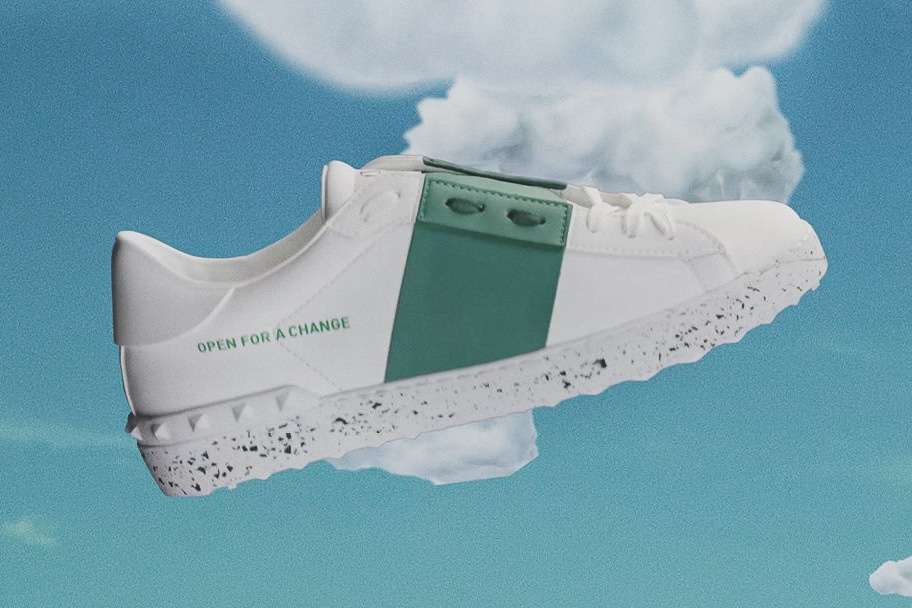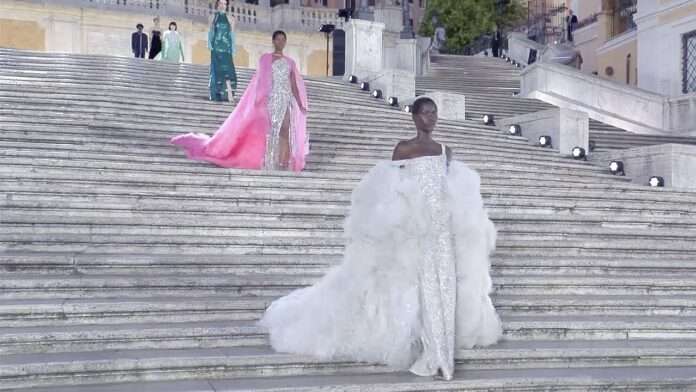Valentino has partnered with Paris-based fabric reseller Tissu Market to bring deadstock to retail.
Historically, leftover materials from the fashion industry were sent to landfill or incinerated; and with up to 100 billion new garments produced each year — most as a result of the fast fashion machine — those fabric remnants are a big problem.
On average, Americans throw out more than 80 pounds of clothing and textiles per person per year — that’s about 11.3 million tons of textile waste every year.
New material production is also problematic; the fashion industry is responsible for at least ten percent of global greenhouse gas emissions and more than 20 percent of all wastewater as well as toxic substances linked to human and environmental issues.
Material matters
As brands look for sustainable solutions, many have turned to renewable or biodegradable materials for new collections. Leftover material, or deadstock, has also found new life for a number of brands working to decrease their carbon footprints; Los Angeles-based Reformation has made deadstock a tentpole, for example. LVMH’s Nona Source opened its first London showroom last May; it offers deadstock from the luxury group’s brands including Louis Vuitton, Christian Dior, and Givenchy.

Italian luxury house Valentino is now doing its part by awakening its sleeping archives of fabrics in the initiative Valentino Sleeping Stock — the new partnership with the Tissu Market fabric reseller in Paris.
The partnership has been a year in the making, with Valentino and Tissu Market saying they’ve both been looking to increase their sustainability metrics. The maison’s deadstock and leftover fabrics from its Haute Couture and Ready-to-Wear collection will be sold to the general public — a first for a luxury couture brand. The initial collection features a range of materials from chiffon and taffeta to satins and silks that had been kept in Valentino archives.
“At the origin of this initiative there is a profound personal and shared conviction: the importance of upcycling as an engine of change that we intend to establish in the fashion sector,” Tissu Market founder Franck Lellouche told Vogue. “The pursuit of excellence, inclusiveness and engagement through the creative process are some of the core values we share and will guide the next steps of this unique partnership.”
The proceeds from sales of its fabrics will support the Bottega dell’Arte di Valentino — the luxury label’s training program.
Waking accountability
The Sleeping Stock launch is the latest sustainability push for Valentino, which debuted its first sustainable sneakers last January. It’s now a fur- and alpaca-free label and has partnered with a sustainable viscose supplier for materials used across 70 percent of production.
It’s also working to reduce its emissions via a partnership with Air France and KLM; it will estimate its air travel and fuel use and then offset the impact by supporting the airlines’ sustainable aviation fuel efforts.

In October, Valentino committed to turning off its store lights at 10 pm to reduce its energy use.
And in September, it dived into its digital footprint with help from the Karma Metrix algorithm.
The first assessment looked at 11 million web pages across the label’s sites, calculating the files, image sizes, coding, and other metrics to determine its digital footprint. According to Valentino, it generates 2.56 grams of CO2 per page view.
The luxury label committed to track a number of sustainability metrics on its road to becoming an energy efficient digital brand. Part of that includes bringing its operations internal for U.S. and Japan e-commerce, with other locations to follow.
Related on Ethos:


